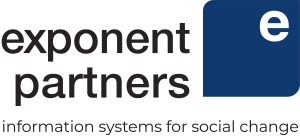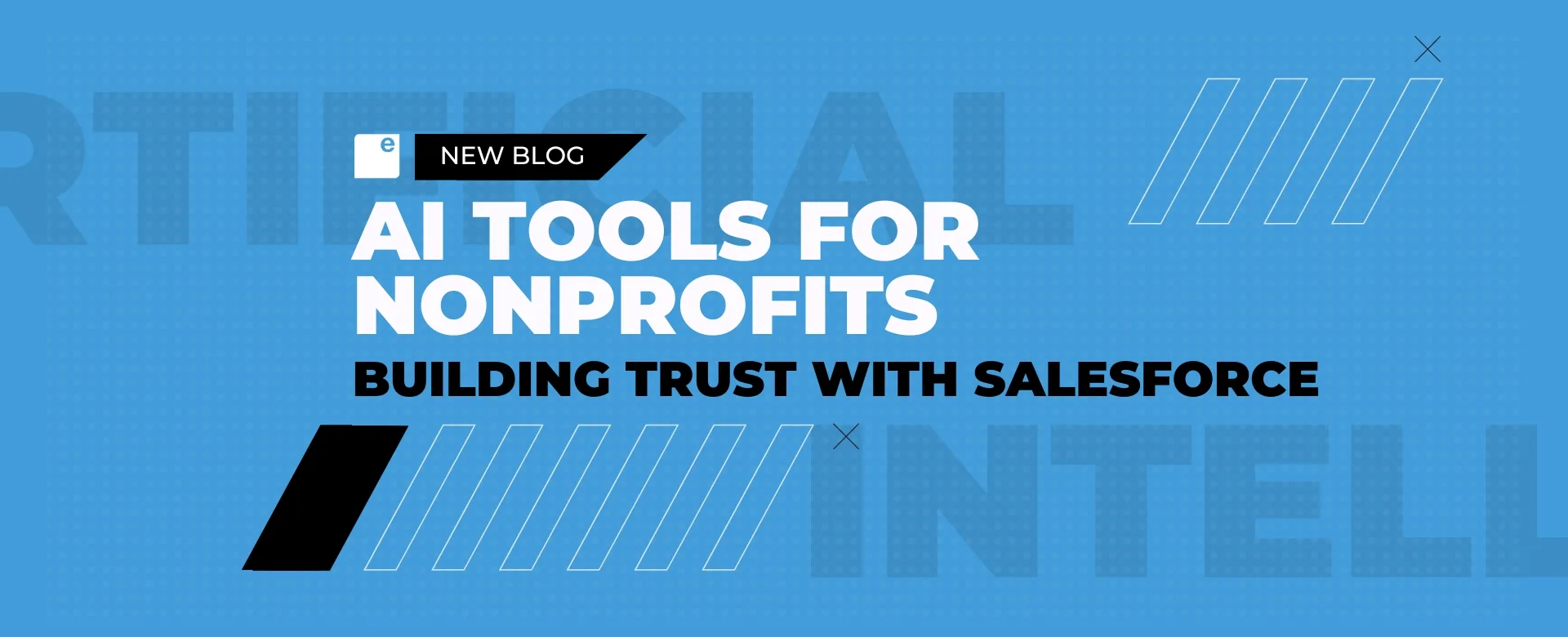AI Tools for Nonprofits: Building Trust with Salesforce
Nonprofits strive to make a difference every day, and powerful technology can amplify this effort. Salesforce’s AI tools offer promising ways to better connect with donors and streamline operations. However, adopting new technology entails a high level of responsibility—one that revolves around data privacy, ethical considerations, and regulatory compliance. In this context, let’s delve into how Salesforce Einstein AI is uniquely positioned to bridge the trust gap and instill confidence among its stakeholders.
Salesforce Einstein AI
Salesforce Einstein AI is a comprehensive suite of AI tools that enhances CRM processes through advanced capabilities. These include natural language processing (NLP), predictive analytics, machine learning, and computer vision.
Key Features and Use Cases for Nonprofits
Let’s explore the key features of Salesforce Einstein AI and how they align with the specific needs of nonprofits.
1. Einstein Discovery
This cutting-edge analytics tool uses algorithms to identify patterns in vast information sets to recommend the most strategic and impactful data combinations. Suppose you’re planning your next fundraiser. Einstein Discovery can provide insights into which fundraising activities yield the highest returns, which outreach messages resonate the most, and where to allocate resources for maximum effect.
2. Einstein Prediction Builder
Possessing foresight is an invaluable asset for any nonprofit. Enter Einstein Prediction Builder, a machine learning platform that enables custom predictive modeling. It can evaluate potential donors from past engagement data and highlight volunteers with relevant management experience. With this powerful feature, you can make educated predictions about future outcomes and tailor your approach for optimal results.
3. Einstein Next Best Action (NBA)
Einstein NBA aids nonprofit decision-making with rule-based and machine learning-generated suggestions. Users can apply it to donor interactions to recommend follow-up actions based on recent contributions, such as crafting personalized thank-you notes or event invitations. It’s also beneficial in case management, suggesting the next best steps for social workers to meet their clients’ needs.
4. Einstein Language
Einstein Language, another NLP tool, extracts insights from text data and offers essential translation capabilities. With its Sentiment Analysis module, nonprofits can gauge the emotional tone of communications. This enables them to better evaluate campaign effectiveness or the public’s response to initiatives. Its Intent Detection module lets organizations discern and prioritize actions based on the motivations behind stakeholder feedback.
Another potent feature is entity recognition, which aids in organizing data by categorizing specific terms, such as event names or dates. Customization tailors it to unique terminologies for a richer understanding and alignment. All these make outreach, collaboration, and donor relationships more seamless.
5. Einstein Bots
Einstein chatbots by Salesforce are AI-powered conversational tools designed to automate and improve user interactions on digital platforms. They process user queries via natural language processing, offer immediate solutions, or direct concerns to the proper department. This could streamline donor inquiries, facilitate volunteer sign-ups, and quickly provide resources on specific projects. For example, when donors ask about fund allocation, the chatbot can instantly share a breakdown. The result is enhanced transparency and trust.
Salesforce Einstein GPT
Einstein GPT is a generative AI model that leverages Generative Pre-trained Transformer (GPT) technology to enhance natural language understanding and generation within the Salesforce AI ecosystem.
Here are the invaluable ways nonprofits can harness Salesforce’s generative AI solutions.
Use Cases and Applications in Nonprofit Organizations
Let’s delve into the practical applications of Einstein GPT within nonprofit organizations.
1. Automate Event Management
Instead of hiring extra hands or depending on manual entries, use Einstein GPT to coordinate event logistics. Send automated reminders or personalized invites based on donor data. If you’re holding a charity run, Einstein GPT can send out customized training schedules to participants.
2. Build Fundraising Pages
Customize fundraising appeals based on the cause and potential donor. If you’re raising funds for a school, Salesforce Einstein GPT can highlight the educational impact and showcase the ripple effect on the community.
3. Generate Reports
Simplify the reporting process by allowing Salesforce Einstein GPT to consolidate data and narrate progress.
4. Improve Donor Engagement
Use the Salesforce generative AI to send personalized communications such as anniversary messages or fund utilization updates. For example, education-focused nonprofits can easily provide child sponsors with updates on their beneficiaries’ academic progress and extracurricular achievements.
5. Integrate with Communication Tools
Sync Salesforce Einstein GPT with your communication platforms, whether email, messaging apps, or CRM tools. This integration enables you to automatically draft emails or messages in a tone that aligns with your nonprofit’s ethos.
Addressing Data Privacy and Compliance Issues
As robust as AI technology is, users worry about how AI tools for nonprofits manage sensitive data. Without proper protocols, there can be mishandling of private information. This can lead to privacy breaches, data misuse, regulatory noncompliance, and more. The great news is that Salesforce Einstein’s AI tools for nonprofits can address these issues with robust data security measures.
Data Security
AI platforms, by design, process immense amounts of data. If this data contains personal or sensitive information, it can be at risk of breaches or unauthorized access to donor and beneficiary information.
Salesforce protects nonprofit stakeholders by implementing multi-layered encryption and advanced threat detection. They further bolster this with customizable security settings to tailor-fit user-specific needs.
GDPR Compliance
Nonprofits operating in Europe are cautious about AI because of strict General Data Protection Regulation (GDPR) requirements that mandate the safeguarding of individuals’ personal data. Noncompliance can result in significant penalties and reputational loss.
Salesforce Einstein AI offers GDPR compliance features, enabling nonprofits to manage data responsibly and in accordance with GDPR. This ensures data privacy and consent management.
HIPAA Compliance
Healthcare nonprofits are skeptical of AI tools due to potential Health Insurance Portability and Accountability Act (HIPAA) compliance risks. They worry about data breaches, unauthorized access, and mismanagement of sensitive patient information, which could result in legal and financial consequences.
Salesforce provides HIPAA-compliant AI solutions, such as Einstein Vision and Language, designed to meet the healthcare industry’s strict data protection standards, enabling nonprofits to leverage AI securely.
Data Consent and Transparency
Nonprofits are wary of AI’s potential lack of transparency and difficulty in obtaining consent for data usage, risking donor trust.
Salesforce emphasizes data consent and transparency, allowing nonprofits to easily manage and communicate data usage policies, fostering trust with donors and beneficiaries.
Bias and Fairness
Nonprofits fear AI systems may perpetuate biases, leading to unfair treatment of individuals based on gender, race, or other factors.
Salesforce addresses bias and fairness concerns by continuously improving its AI algorithms and providing tools for nonprofits to assess and mitigate bias in their AI applications, promoting equity and inclusivity in their operations.
5 Principles of Responsible AI
Trust was a central focus at the recent Salesforce AI Day, as the organization revealed the emerging direction of Trusted AI. Recognizing its crucial role in AI adoption, Salesforce outlined the following principles:
1. Accuracy
Salesforce Einstein GPT banks on user-trained data for reliability. This allows users to verify accuracy, understand the AI’s decision-making logic, and know its data sources.
2. Transparency
Salesforce ensures that users understand the reasoning behind every AI-driven recommendation and prediction, allowing them to make educated decisions, identify unintended consequences, and mitigate potential harm.
3. Safety
Salesforce is committed to AI technologies that are respectful and beneficial to all individuals and communities.
4. Empowerment
Salesforce stresses the importance of users being in control of Salesforce Einstein GPT. This involves empowering users to adjust, fine-tune, or even override AI decisions.
5. Sustainability
Salesforce is committed to making right-sized models that optimize performance while reducing the AI operations’ carbon footprint.
What is the Einstein GPT Trust Layer and How Does It Work?
Salesforce further elevates responsible AI with the Einstein Trust Layer. This comprises advanced AI tools that ensure the ethical use of AI within the Salesforce environment. When AI decisions are transparent and fair, donors and beneficiaries can believe in the organization’s mission. Ethical AI sees to it that actions align with values. This keeps the support strong and the impact genuine. Thus, Salesforce’s think tank created the Einstein Trust Layer.
In essence, this groundbreaking technology protects data by ensuring that large-language models (LLMs) don’t hold onto confidential customer information. Because they’re trained on vast amounts of data, they might mistakenly echo sensitive phrases encountered during training. The Einstein Trust Later prevents this from happening through a rigorous workflow:
- Prompt: A user interacts with Salesforce’s CRM app. Their request or command is taken as a prompt. This guides what needs to be done or retrieved.
- Secure Data Retrieval: This step fetches the necessary data securely and prevents unauthorized access.
- Dynamic Grounding: This NLP technique helps the system grasp the meaning of words or phrases based on the surrounding text.
- Data Masking: To protect the confidentiality of donor information, data masking replaces names, exact addresses, and credit card numbers with generic “placeholders.” For example, John Doe becomes “Donor” and most of the credit card digits will be replaced with Xs.
- Secure Gateway: The masked data then moves through a secure gateway, which serves as a checkpoint for unauthorized access or potential breaches.
- Zero Retention: Once the data is used, the system gets rid of it to prevent unnecessary and risky retention.
- Generation: Next, based on the masked and context-understood data, the system generates the required outputs or actions.
- Toxicity Detection: The system scans for any potentially harmful or offensive content in the generated output.
- Audit Trail: This is the record-keeping step. Actions, decisions, and operations are logged for transparency, traceability, and accountability.
- Back to CRM App: The final, sanitized, and verified output is sent back to the CRM application for the user to see or interact with.
Bolstering Your Mission with Salesforce’s Transformative AI
Every nonprofit recognizes that behind every data point, there’s a heartbeat, a life waiting to be transformed—and saved. That’s why leveraging the right technology is vital. Through Salesforce’s unparalleled AI tools for nonprofits, organizations not only streamline operations but also fortify donor relationships and trust. But harnessing this transformative power is no small feat.
With Exponent Partners, you can secure tailored AI solutions finely calibrated to your organization’s unique needs. Beyond that, you gain a dedicated partner who understands your mission’s depth. With hearts on fire for impactful change—plus over 100 Salesforce certifications—our team ensures you have the best in the nonprofit field championing your cause. Let Exponent Partners help you to create radically better impact. Contact us today for a free consultation!

